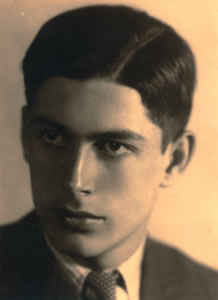|
Hans-Günter Klein
Hans-Günter Klein (24 November 1939 in Berlin – 7 April 2016 idem) was a German musicologist, librarian, art historian, LGBT activist and researcher on the Mendelssohn family.Mendelssohn-Studien, published for the by , Rudolf Elvers, Hans-Günter Klein, Christoph Schulte and Roland Schmidt-Hensel, Berlin, später Hannover 1972ff. Life and activity During the Second World War, the Klein family fled to Pomerania. After that he grew up in Hamburg, where he studied musicology, philosophy and history of art. In 1969 he received his doctorate. He immediately moved to Berlin to the music department of the Staatsbibliothek zu Berlin, whose Mendelssohn Archive he joined after Rudolf Elvers left the library (1988) and headed it for fifteen years (until 2003). Klein was heavily involved in research on musicians who were persecuted or ostracized during the National Socialist era, including Viktor Ullmann and Gideon Klein. Klein, who had also met Magnus Hirschfeld's collaborator Kurt Hill ... [...More Info...] [...Related Items...] OR: [Wikipedia] [Google] [Baidu] |
Musicologist
Musicology (from Greek μουσική ''mousikē'' 'music' and -λογια ''-logia'', 'domain of study') is the scholarly analysis and research-based study of music. Musicology departments traditionally belong to the humanities, although some music research is scientific in focus (psychological, sociological, acoustical, neurological, computational). Some geographers and anthropologists have an interest in musicology so the social sciences also have an academic interest. A scholar who participates in musical research is a musicologist. Musicology traditionally is divided in three main branches: historical musicology, systematic musicology and ethnomusicology. Historical musicologists mostly study the history of the western classical music tradition, though the study of music history need not be limited to that. Ethnomusicologists draw from anthropology (particularly field research) to understand how and why people make music. Systematic musicology includes music theory, aesthe ... [...More Info...] [...Related Items...] OR: [Wikipedia] [Google] [Baidu] |
Kurt Hiller
Kurt Hiller (17 August 1885, Berlin – 1 October 1972, Hamburg) was a German essayist, lawyer, and expressionist poet. He was also a political (namely pacifist) journalist. Hiller came from a middle-class Jewish background. A communist, he was deeply influenced by Immanuel Kant and Arthur Schopenhauer, despising the philosophy of G. W. F. Hegel, which made him quite unpopular with Marxists. Hiller was also an influential writer in the early German gay rights movement in the first two decades of the 20th century. Hiller was elected as vice-chairman of the Scientific Humanitarian Committee in 1929. In 1929 he took over as chairman from fellow gay activist Magnus Hirschfeld. Like Hirschfeld, he had affairs with men but did not publicly identify himself as homosexual. He is remembered, too, for his book ''§175: Schmach des Jahrhunderts'' (Paragraph 175: Outrage of the Century) published in 1922. Hiller maintained that if homosexuals wanted change, they would have to effect ... [...More Info...] [...Related Items...] OR: [Wikipedia] [Google] [Baidu] |
1930 Births
Year 193 ( CXCIII) was a common year starting on Monday (link will display the full calendar) of the Julian calendar. At the time, it was known as the Year of the Consulship of Sosius and Ericius (or, less frequently, year 946 '' Ab urbe condita''). The denomination 193 for this year has been used since the early medieval period, when the Anno Domini calendar era became the prevalent method in Europe for naming years. Events By place Roman Empire * January 1 – Year of the Five Emperors: The Roman Senate chooses Publius Helvius Pertinax, against his will, to succeed the late Commodus as Emperor. Pertinax is forced to reorganize the handling of finances, which were wrecked under Commodus, to reestablish discipline in the Roman army, and to suspend the food programs established by Trajan, provoking the ire of the Praetorian Guard. * March 28 – Pertinax is assassinated by members of the Praetorian Guard, who storm the imperial palace. The Empire is auctioned o ... [...More Info...] [...Related Items...] OR: [Wikipedia] [Google] [Baidu] |
German LGBT Rights Activists
German(s) may refer to: * Germany (of or related to) ** Germania (historical use) * Germans, citizens of Germany, people of German ancestry, or native speakers of the German language ** For citizens of Germany, see also German nationality law **Germanic peoples (Roman times) * German language **any of the Germanic languages * German cuisine, traditional foods of Germany People * German (given name) * German (surname) * Germán, a Spanish name Places * German (parish), Isle of Man * German, Albania, or Gërmej * German, Bulgaria * German, Iran * German, North Macedonia * German, New York, U.S. * Agios Germanos, Greece Other uses * German (mythology), a South Slavic mythological being * Germans (band), a Canadian rock band * "German" (song), a 2019 song by No Money Enterprise * ''The German'', a 2008 short film * "The Germans", an episode of ''Fawlty Towers'' * ''The German'', a nickname for Congolese rebel André Kisase Ngandu See also * Germanic (other) * ... [...More Info...] [...Related Items...] OR: [Wikipedia] [Google] [Baidu] |
German Librarians
German(s) may refer to: * Germany (of or related to) **Germania (historical use) * Germans, citizens of Germany, people of German ancestry, or native speakers of the German language ** For citizens of Germany, see also German nationality law **Germanic peoples (Roman times) * German language **any of the Germanic languages * German cuisine, traditional foods of Germany People * German (given name) * German (surname) * Germán, a Spanish name Places * German (parish), Isle of Man * German, Albania, or Gërmej * German, Bulgaria * German, Iran * German, North Macedonia * German, New York, U.S. * Agios Germanos, Greece Other uses * German (mythology), a South Slavic mythological being * Germans (band), a Canadian rock band * "German" (song), a 2019 song by No Money Enterprise * ''The German'', a 2008 short film * "The Germans", an episode of ''Fawlty Towers'' * ''The German'', a nickname for Congolese rebel André Kisase Ngandu See also * Germanic (other) * Germa ... [...More Info...] [...Related Items...] OR: [Wikipedia] [Google] [Baidu] |
Berlin-Kreuzberg
Kreuzberg () is a district of Berlin, Germany. It is part of the Friedrichshain-Kreuzberg borough located south of Mitte. During the Cold War era, it was one of the poorest areas of West Berlin, but since German reunification in 1990 it has become more gentrified and known for its arts scene. The borough is known for its large percentage of immigrants and descendants of immigrants, many of whom are of Turkish ancestry. As of 2006, 31.6% of Kreuzberg's inhabitants did not have German citizenship. Kreuzberg is noted for its diverse cultural life and experimental alternative lifestyles, and is an attractive area for many, however, some parts of the district are still characterized by higher levels of unemployment. The counterculture tradition of Kreuzberg led to a plurality of votes for the Green Party, which is unique among all Berlin boroughs. Geography Layout Kreuzberg is bounded by the river Spree in the east. The Landwehrkanal flows through Kreuzberg from east to we ... [...More Info...] [...Related Items...] OR: [Wikipedia] [Google] [Baidu] |
Mehringdamm
The Mehringdamm is a street in southern Kreuzberg, Berlin. In the north it starts at Mehringbrücke and ends - with its southernmost houses already belonging to Tempelhof locality - on Platz der Luftbrücke. It is the historical southbound Berlin-Halle highway, now forming the federal route 96. The main junction of Mehringdamm is with the 19th-century ring road around Berlin's inner city, named Yorckstraße west, and Gneisenaustraße east of Mehringdamm. History The highway from Cölln (since 1710 a part of Berlin) to Halle upon Saale and Leipzig traverses the quarter of Tempelhofer Vorstadt (Bezirksregion II of Friedrichshain-Kreuzberg) from north to south on a length of .''Baedekers Berlin-Kreuzberg: Bezirksführer'' (11977), Ostfildern/Kemnat and Munich: Baedeker, 21988, p. 37. . Before it was paved, horses and coaches going up the highway to the level of the Teltow Plateau, rising between Bergmannstraße and Fidicinstraße by ,Klaus-Dieter Wille, ''Spaziergän ... [...More Info...] [...Related Items...] OR: [Wikipedia] [Google] [Baidu] |
Magnus Hirschfeld
Magnus Hirschfeld (14 May 1868 – 14 May 1935) was a German physician and sexologist. Hirschfeld was educated in philosophy, philology and medicine. An outspoken advocate for sexual minorities, Hirschfeld founded the Scientific-Humanitarian Committee and World League for Sexual Reform. He based his practice in Berlin-Charlottenburg during the Weimar period. Historian Dustin Goltz characterized the committee as having carried out "the first advocacy for homosexual and transgender rights".Goltz, Dustin (2008). "Lesbian, Gay, Bisexual, Transgender, and Queer Movements", In Lind, Amy; Brzuzy, Stephanie (eds.). ''Battleground: Women, Gender, and Sexuality: Volume 2'', pp. 291 ff. Greenwood Publishing Group, He is regarded as one of the most influential sexologists of the twentieth century. Hirschfeld was targeted by Nazis for being Jewish and gay; he was beaten by '' völkisch'' activists in 1920, and in 1933 his ''Institut für Sexualwissenschaft'' was sacked and had its books bur ... [...More Info...] [...Related Items...] OR: [Wikipedia] [Google] [Baidu] |
Librarian
A librarian is a person who works professionally in a library providing access to information, and sometimes social or technical programming, or instruction on information literacy to users. The role of the librarian has changed much over time, with the past century in particular bringing many new media and technologies into play. From the earliest libraries in the ancient world to the modern information hub, there have been keepers and disseminators of the information held in data stores. Roles and responsibilities vary widely depending on the type of library, the specialty of the librarian, and the functions needed to maintain collections and make them available to its users. Education for librarianship has changed over time to reflect changing roles. History The ancient world The Sumerians were the first to train clerks to keep records of accounts. ''"Masters of the books"'' or "keepers of the tablets" were scribes or priests who were trained to handle the vast amount and c ... [...More Info...] [...Related Items...] OR: [Wikipedia] [Google] [Baidu] |
Gideon Klein
Gideon Klein (6 December 1919 – c. January 1945) was a Czechoslovakia, Czechoslovakian pianist, european classical music, classical music composer, educator and organizer of cultural life at Theresienstadt concentration camp. Life Klein was born into a Moravian Jewish family in Přerov and, showing musical talent early, studied piano with Růžena Kurzová and Vilém Kurz, and composition with Alois Hába (in 1939–40). He was forced to abort his university studies in 1940 when the Nazis closed all institutions of higher learning following their occupation of Czechoslovakia in March 1939. Since compositions and performances by Jewish musicians were banned, his own works could not be performed, though he managed to perform as a concert pianist under several aliases for a time, e.g., under the pseudonym Karel Vranek. Despite those harsh circumstances Klein managed to continue composing. In 1940 he was offered a scholarship at the Royal Academy of Music in London, but by that time ... [...More Info...] [...Related Items...] OR: [Wikipedia] [Google] [Baidu] |







